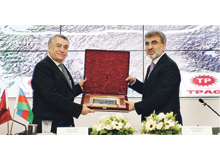| |
 | Insurance Education |
|
|  | Insurance Glosary |
|
|  | Medical Tourism Destination |
|
|  | Time Zones |
|
|  | Climate in Turkey |
|
|  | Tourism Offices in Turkey |
|
|  | Social Security |
|
|  | Tourism Environment |
|
|  | Price Statics |
|
|  | Arranging The Trip |
|
|  | Treatment Process |
|
|  | About Turkey |
|
|  | Turkish Medical Tourism |
|
|  | Why is Turkey? |
|
|
|
|
 |
Turkey has inked a deal at an estimated value of $5 billion to carry Azerbaijani gas to European markets via a pipeline to cross its borders, adding to the country´s emerging role as a key energy supply corridor in its region.
|
Turkish Energy and Natural Resources Minister Taner Yıldız and his Azerbaijani counterpart, Natig Aliyev, signed a contract in Ankara on Monday to construct a natural gas pipeline, named the Trans Anadolu Natural Gas Pipeline, to transfer gas from Azerbaijan's Shah Deniz fields to Europe. The pipeline is designed to carry 10 billion cubic meters (cbm) of natural gas to EU markets.
With the deal, the State Oil Company of the Azerbaijani Republic (SOCAR), the state-owned Turkish Pipeline Corporation (BOTAŞ) and the Turkish Petroleum Corporation (TPAO) will set up a consortium for the construction of the pipeline. Energy Ministry officials said third-party international oil and natural gas companies would be allowed to join the consortium later during the construction process. The consortium plans to start construction as soon as possible -- in 2012 -- in order to complete it by late 2017.
Providing project details, Yıldız said the Turkish side will have a 20 percent stake in the consortium, while Azerbaijan's share is 80 percent. Yıldız asserted that the Trans Anadolu pipeline was not an alternative to other planned pipelines to run through Turkish territories. Aliyev said SOCAR expects to finalize the feasibility studies next month before it starts construction of the pipeline. The Azerbaijani minister said the volume of gas flowing through Trans Anadolu would be increased to 24 billion cubic meters in the medium term. Observers said this figure is important considering Azerbaijan's goal of increasing its gas production to 50 bcm per year by 2025 from the 25.3 bcm expected this year.
This is not the first energy supply deal between the two traditional allies. Presently, Azerbaijani natural gas is transported into Turkey via the Baku-Tbilisi-Erzurum pipeline, whereas its oil flows to its western neighbor via the Baku-Tbilisi-Ceyhan pipeline. Observers argue future pipelines will allow Turkey and Azerbaijan to play a more powerful role in their region.
As both countries are currently enjoying an economic boom, mutual investments between Turkey and its kin neighbor have increased remarkably in past decade. Azerbaijani investments in Turkey have reached billions of dollars in size. The most of recent of them was the Star Refinery, a joint oil refinery investment valued at $5 billion between SOCAR and Turkey’s Turcas (SOCAR-Turcas, the largest single private investment realized in Turkey.
Turkish-Azeri partnership challenge Russian domination in EU
A promising market for natural gas providers, Europe’s natural gas consumption -- production and exports combined -- was estimated at 522.7 billion cubic meters in 2010. Turkey and Azerbaijan have in recent years intensified cooperation to offer alternative routes to diversify energy supply – particularly natural gas – to a ‘thirsty’ EU market. Yıldız’ remarks on Monday acknowledge such desire. The minister said at Monday’s signing ceremony that Trans Anadolu would contribute to efforts to diversify west-bound energy supply routes.” Azerbaijan and Turkey are known to have long been examining ways to diversifying energy supply routes and sources to Europe. This actually is also an EU priority and the union places heavy importance on energy security.
Turkey’s gas-rich southern neighbor Russia is currently the major provider of natural gas to Europe; the country exports around one fourth of its annual natural gas production to EU markets. Russia’s Gazprom’s reputation as a reliable partner was shaken following a crisis with one of the transit countries, Ukraine in 2009 when the latter suspended Russian gas flow to Europe amid a conflict over gas tariffs. The supplier expects to maintain dominance in EU gas markets following a Nord Stream pipeline deal signed with majority of European countries this November. Russia expects to increase its share in EU gas imports to 30 percent by 2013. Russian government is expecting Turkey to OK a South Stream pipeline project, which is designed to transport Russian natural gas to Europe by passing through Turkish territorial waters. Turkish side; however, has not said its final word in what observers see as a policy to obtain extra time for the Nabucco pipeline project, which is seen as a rival to South Stream and is strongly backed by the European Union and the United States. Geographical proximity and diversified transit routes were the major factors to strengthen Russian presence in EU gas markets. Although determined to act together in many fields, Turkey and Azerbaijan failed to cultivate a gas trade tie with the EU at a desired level in the past. Observers argued the latest deal in Turkish-Azerbaijani partnership is particularly eminent in that European consumers will have a single voice to address for their future gas orders.
|
Source : todayszaman.com
Hit : 770
|
|
|
|




